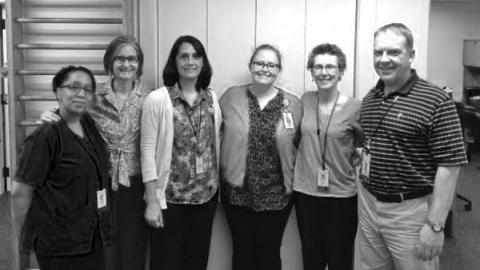Rehab at Carol Woods

July 21, 2017 -
During the 2.5 year period between my first significant pain and hip replacement surgery (followed by rehab), I had the opportunity to experience directly the advantages we residents enjoy because of the full-time status of the primary staff of our Rehabilitation Department. Director Craig Anderson says, “As staff members, we only have Carol Woods residents’ best interests in mind.”
My saga began by taking advantage of the department’s weekly drop-in consultation hour (every Thursday from 2-3 p.m.). The consultation with a therapist requires no physician referral and neither Medicare nor the resident is charged!
Following consultation, the therapist requested a referral from my Carol Woods physician leading to six to eight weeks of therapy, which granted me a whole year of pain-free, nearly normal activity. Unfortunately, a sudden return of pain eventually led to surgery and rehabilitation in Building 4. But by this time I had friends on the staff. The same person who had provided the therapy two years before was my primary therapist during rehabilitation. She fitted me with a rolling walker borrowed from the collection of equipment donated by previous users and lent to residents who do not need them permanently.Two occupational therapists also became friends as they helped me learn to don those blasted elastic stockings and went with me to our cottage to make sure I could move about, do laundry and shower safely. And Craig met me at the cottage for my “final exam”: to walk from the cottage to the main building, a trip I would need to make at least once a day after leaving the Health Center. All that personal attention while never leaving the campus!
In addition to Craig, the full-time Rehab Department staff includes two other physical therapists, Andy Blackburn and Ann Chamberlin; occupational therapists Sarah Smiley and Elizabeth Hart; and physical therapy aide Tammy Williams. Several therapists in private practice come in to cover busy times or vacations. Denise Caignon, a speech therapist, is contracted as needed.
The staff also finds advantages in full-time status. They know their clients better and are familiar with the campus environment. In addition, they have access and support for programs to develop their professional skills. During the past year, Ann participated in the LeadingAge NC Leadership Academy, a year-long program designed to develop non-profit aging services leaders statewide. And Sarah participated in an on-campus leadership academy. Both felt they expanded their comfort zones and will be able to contribute more to their professions and to Carol Woods as a result.
-- Resident Nancy M.
